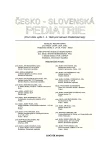-
Medical journals
- Career
Hyponatremia as a Cause of Failure to Thrive
Authors: J. Zapletalová; P. Geier; V. Mihál
Authors‘ workplace: Dětská klinika LF UP a FN, Olomouc přednosta prof. MUDr. V. Mihál, CSc.
Published in: Čes-slov Pediat 2005; 60 (6): 385-388.
Category: Original Papers
Overview
There are different causes of hyponatremia, but the clinical course is mostly uniform, especially in sucklings: vomiting, dehydration and failure to thrive. The simple basic examination, which enables the application of modern rational diagnostic algorithms, is the evaluation of the state of dehydration, the determination of sodium and potassium levels in blood serum and sodium concentration in urine (before the initiation of therapy, if possible).
Various causes of severe hyponatremia resulting from absolute or relative deficit of aldosterone, associated with clinical signs of serious illness, are demonstrated on the cases of three children at the age of two to six weeks.Key words:
failure to thrive, hyponatremia, hypoaldosteronism, pseudohypoaldosteronism
Labels
Neonatology Paediatrics General practitioner for children and adolescents
Article was published inCzech-Slovak Pediatrics

2005 Issue 6-
All articles in this issue
- Pituitary Morphology in Patients with Combined Pituitary Hormone Deficiency Due to PROP1 Gene Mutations
- Retrospective Analysis of Growth in Tumors of Hypothalamus-Hypophysis Region
- Homozygous Form of Familial Defect of Apo B-100 (FDB) in a 7-Year Girl
- Growth and Final Height in Girls with Central Precocious Puberty after Long-term Treatment with Depot Gonadoliberin Analogue
- Prader-Willi Syndrome: Changes in Growth Dynamics and Body Composition during Treatment with Growth Hormone
- Relation of Sexual and Skeletal Maturity Assessment to Biological Age in Pediatric Practice
- Neonatal Screening for Cystic Fibrosis Review
- The Effects of Physical Activity on Blood Lipids and Lipoproteins in Children
- Hyponatremia as a Cause of Failure to Thrive
- Prediction and Prevention of Type 1 Diabetes Mellitus
- Human Genome, Monogenic Diabetes Mellitus and Our Paediatric Patients
- Neonatal Diabetes Mellitus Caused by Activation Mutation in the Gene Encoding the Kir6.2 Subunit of Potassium Channel: Is Insulindependency Inevitably Life-long?
- Czech-Slovak Pediatrics
- Journal archive
- Current issue
- Online only
- About the journal
Most read in this issue- Relation of Sexual and Skeletal Maturity Assessment to Biological Age in Pediatric Practice
- Growth and Final Height in Girls with Central Precocious Puberty after Long-term Treatment with Depot Gonadoliberin Analogue
- Homozygous Form of Familial Defect of Apo B-100 (FDB) in a 7-Year Girl
- Prediction and Prevention of Type 1 Diabetes Mellitus
Login#ADS_BOTTOM_SCRIPTS#Forgotten passwordEnter the email address that you registered with. We will send you instructions on how to set a new password.
- Career

